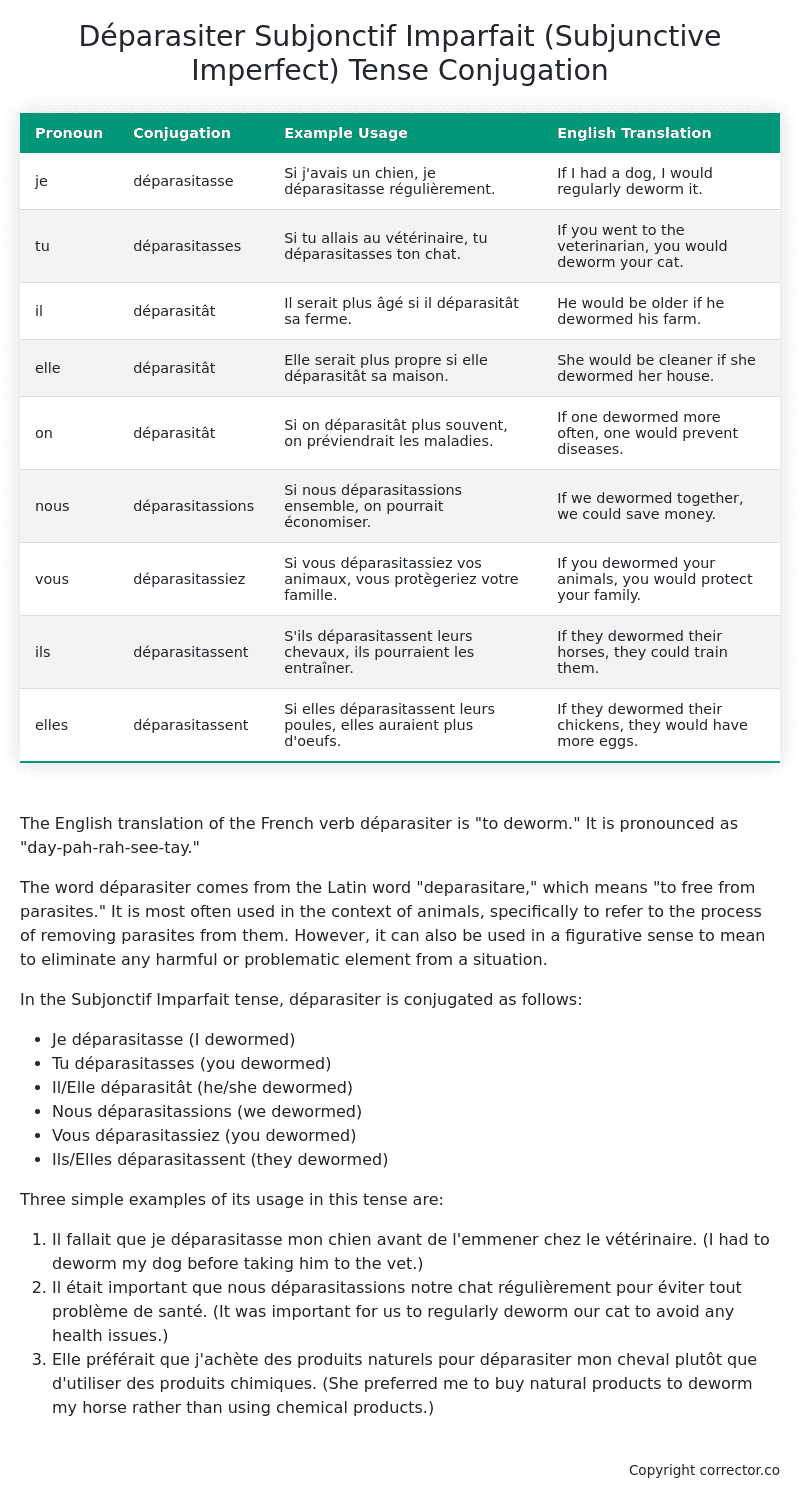Subjonctif Imparfait (Subjunctive Imperfect) Tense Conjugation of the French Verb déparasiter
Introduction to the verb déparasiter
The English translation of the French verb déparasiter is “to deworm.” It is pronounced as “day-pah-rah-see-tay.”
The word déparasiter comes from the Latin word “deparasitare,” which means “to free from parasites.” It is most often used in the context of animals, specifically to refer to the process of removing parasites from them. However, it can also be used in a figurative sense to mean to eliminate any harmful or problematic element from a situation.
In the Subjonctif Imparfait tense, déparasiter is conjugated as follows:
- Je déparasitasse (I dewormed)
- Tu déparasitasses (you dewormed)
- Il/Elle déparasitât (he/she dewormed)
- Nous déparasitassions (we dewormed)
- Vous déparasitassiez (you dewormed)
- Ils/Elles déparasitassent (they dewormed)
Three simple examples of its usage in this tense are:
- Il fallait que je déparasitasse mon chien avant de l’emmener chez le vétérinaire. (I had to deworm my dog before taking him to the vet.)
- Il était important que nous déparasitassions notre chat régulièrement pour éviter tout problème de santé. (It was important for us to regularly deworm our cat to avoid any health issues.)
- Elle préférait que j’achète des produits naturels pour déparasiter mon cheval plutôt que d’utiliser des produits chimiques. (She preferred me to buy natural products to deworm my horse rather than using chemical products.)
Table of the Subjonctif Imparfait (Subjunctive Imperfect) Tense Conjugation of déparasiter
| Pronoun | Conjugation | Example Usage | English Translation |
|---|---|---|---|
| je | déparasitasse | Si j’avais un chien, je déparasitasse régulièrement. | If I had a dog, I would regularly deworm it. |
| tu | déparasitasses | Si tu allais au vétérinaire, tu déparasitasses ton chat. | If you went to the veterinarian, you would deworm your cat. |
| il | déparasitât | Il serait plus âgé si il déparasitât sa ferme. | He would be older if he dewormed his farm. |
| elle | déparasitât | Elle serait plus propre si elle déparasitât sa maison. | She would be cleaner if she dewormed her house. |
| on | déparasitât | Si on déparasitât plus souvent, on préviendrait les maladies. | If one dewormed more often, one would prevent diseases. |
| nous | déparasitassions | Si nous déparasitassions ensemble, on pourrait économiser. | If we dewormed together, we could save money. |
| vous | déparasitassiez | Si vous déparasitassiez vos animaux, vous protègeriez votre famille. | If you dewormed your animals, you would protect your family. |
| ils | déparasitassent | S’ils déparasitassent leurs chevaux, ils pourraient les entraîner. | If they dewormed their horses, they could train them. |
| elles | déparasitassent | Si elles déparasitassent leurs poules, elles auraient plus d’oeufs. | If they dewormed their chickens, they would have more eggs. |
Other Conjugations for Déparasiter.
Le Present (Present Tense) Conjugation of the French Verb déparasiter
Imparfait (Imperfect) Tense Conjugation of the French Verb déparasiter
Passé Simple (Simple Past) Tense Conjugation of the French Verb déparasiter
Passé Composé (Present Perfect) Tense Conjugation of the French Verb déparasiter
Futur Simple (Simple Future) Tense Conjugation of the French Verb déparasiter
Futur Proche (Near Future) Tense Conjugation of the French Verb déparasiter
Plus-que-parfait (Pluperfect) Tense Conjugation of the French Verb déparasiter
Passé Antérieur (Past Anterior) Tense Conjugation of the French Verb déparasiter
Futur Antérieur (Future Anterior) Tense Conjugation of the French Verb déparasiter
Subjonctif Présent (Subjunctive Present) Tense Conjugation of the French Verb déparasiter
Subjonctif Passé (Subjunctive Past) Tense Conjugation of the French Verb déparasiter
Subjonctif Imparfait (Subjunctive Imperfect) Tense Conjugation of the French Verb déparasiter (this article)
Conditionnel Présent (Conditional Present) Tense Conjugation of the French Verb déparasiter
Conditionnel Passé (Conditional Past) Tense Conjugation of the French Verb déparasiter
L’impératif Présent (Imperative Present) Tense Conjugation of the French Verb déparasiter
L’infinitif Présent (Infinitive Present) Tense Conjugation of the French Verb déparasiter
Struggling with French verbs or the language in general? Why not use our free French Grammar Checker – no registration required!
Get a FREE Download Study Sheet of this Conjugation 🔥
Simply right click the image below, click “save image” and get your free reference for the déparasiter Subjonctif Imparfait tense conjugation!

Déparasiter – About the French Subjonctif Imparfait (Subjunctive Imperfect) Tense
Formation
Common Everyday Usage Patterns
Interactions with Other Tenses
Subjonctif Présent
Indicatif Passé Composé
Conditional
Conditional Perfect
Summary
I hope you enjoyed this article on the verb déparasiter. Still in a learning mood? Check out another TOTALLY random French verb conjugation!


